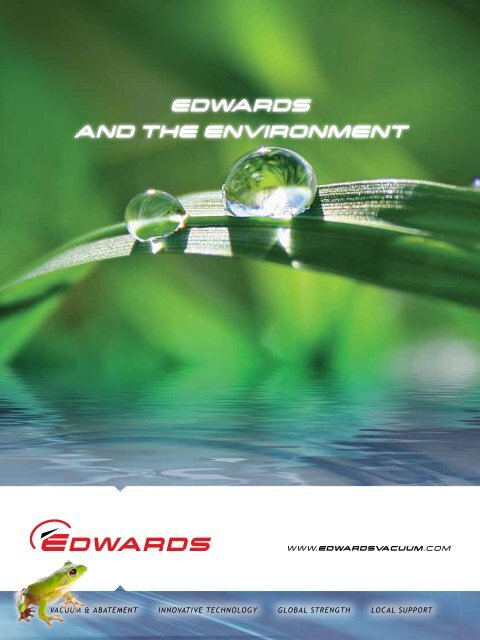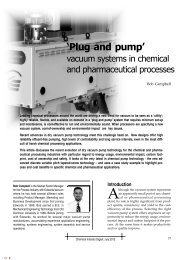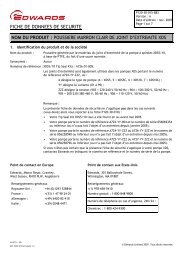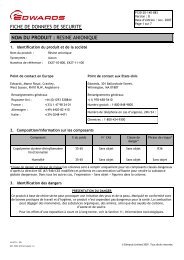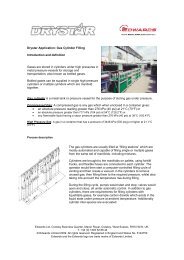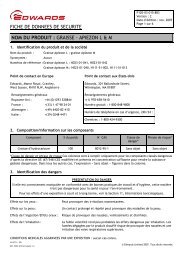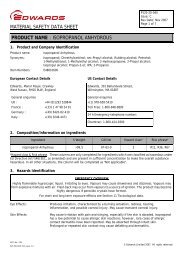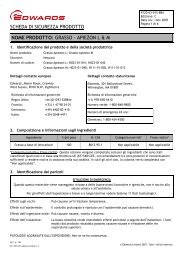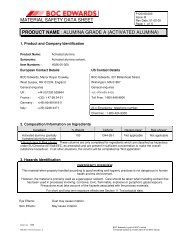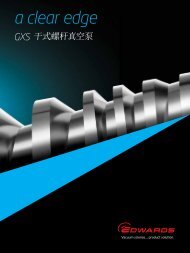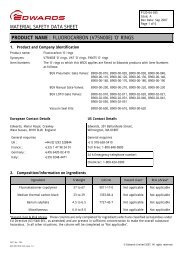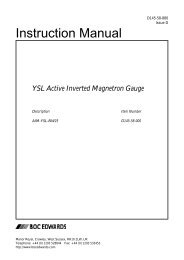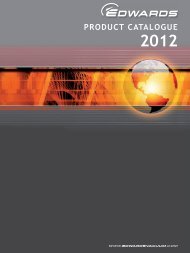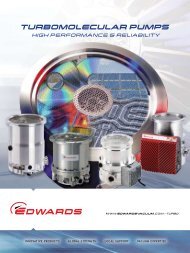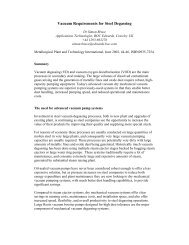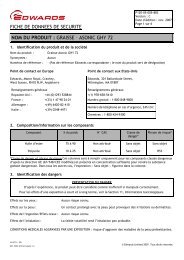EDWARDS AND THE ENVIRONMENT
EDWARDS AND THE ENVIRONMENT
EDWARDS AND THE ENVIRONMENT
You also want an ePaper? Increase the reach of your titles
YUMPU automatically turns print PDFs into web optimized ePapers that Google loves.
<strong>EDWARDS</strong><br />
<strong>AND</strong> <strong>THE</strong> <strong>ENVIRONMENT</strong><br />
VACUUM & ABATEMENT INNOVATIVE TECHNOLOGY GLOBAL STRENGTH LOCAL SUPPORT
Our Commitment<br />
We will be the leader in the field of vacuum pumping and abatement by applying technology,<br />
products and services to benefit the environment for future generations.<br />
Edwards is committed to excellence in the management of the environment and there is no<br />
higher priority for us.<br />
• Over our product’s lifecycle we are Green House Gas or Carbon equivalent negative, in<br />
other words our abatement products destroy compounds that have a very high global<br />
warming potential.<br />
• Our technologies enable the manufacturing of a wide range of environmental products<br />
- vacuum is essential for the production of solar<br />
cells and solid state lighting.<br />
• When our products need replacing we offer ways<br />
to refurbish them for reuse – we already refurbish<br />
35,000 of them each year. At the end of their life<br />
cycle, our vacuum products are disassembled so<br />
that their primary materials are recycled keeping<br />
them out of landfills.<br />
• We’re also investing in new facilities that meet<br />
or exceed environmental norms and changing the<br />
ways we work.<br />
Read on to find out how we are doing it...<br />
and see our website for live updates on our progress.<br />
Matthew Taylor - CEO, Edwards<br />
Our Policy & Goals<br />
We are committed to constantly improving our environmental systems and our performance.<br />
• Climate change<br />
——<br />
Reduce our products’ energy consumption<br />
——<br />
Working to SEMI, ITRS & S23 guidelines*<br />
——<br />
Reduce our emissions<br />
——<br />
Reduce our customers’ emissions<br />
• Resource Conservation<br />
——<br />
Reduce/Reuse/Recycle<br />
——<br />
Reduce hazardous content of our products<br />
——<br />
Remanufacturing & Service<br />
* SEMI = Semiconductor Equipment & Materials International<br />
ITRS = International Technology Roadmap for Semiconductors<br />
S23 = Guide for conservation of energy, utilities and materials used by semiconductor manufacturing equipment
Our Aims<br />
To support these aims, we have published a set of Green Goals covering our plans to reduce the impact of<br />
our operations of our products. We will …<br />
• Reduce our customers’ carbon footprints through the use of our products - by providing equipment to<br />
abate our customers’ emissions and introducing high efficiency vacuum and abatement products.<br />
• Reduce the carbon intensity of our operations.<br />
• Reduce waste - from our facilities, eliminating all waste to landfill - and by enabling the reuse of our<br />
products through service and remanufacture.<br />
• Reduce water usage at our facilities.<br />
Strong environmental systems in place<br />
• Major sites certified to ISO14001<br />
——<br />
International standard for environmental management systems.<br />
• Member of Electronic Industries Citizenship Coalition (EICC)<br />
——<br />
An electronics industry scheme to improve the social, economic and environmental<br />
conditions of the industry and its supply chain.<br />
• Member of SEMI Global Care<br />
——<br />
Semiconductor industry program encouraging improvement and excellence in environment,<br />
safety and product stewardship.<br />
• Member of the International Sematech Manufacturing Initiative (ISMI)<br />
——<br />
World-wide collaborative program dedicated to cooperatively finding and implementing the<br />
most cost-effective, environmentally-friendly manufacturing processes and procedures.<br />
• Member of Mayday Network<br />
——<br />
UK’s largest group of businesses committed to taking action on climate change.<br />
• Contributing to case studies, such as the Special Report on GHG Management and<br />
Reporting, with Institute of Environmental Management and Assessment (IEMA) the<br />
professional membership body for promoting best practice standards in environmental<br />
management, auditing and assessment for all industry sectors.
“... over our products’ life cycle<br />
we are carbon negative”<br />
Carbon Report<br />
The carbon footprint converts all materials, transport and energy use into an equivalent amount of<br />
Carbon Dioxide (CO 2<br />
) generated.<br />
To calculate our carbon footprint we need to look at the CO 2<br />
generated by our operations and our<br />
products in use in the following key areas:<br />
• Materials • Facilities • Transport • Product use • Abatement<br />
Annual CO 2<br />
e reduction due to Edwards<br />
products - production and use (millions tonnes)<br />
2<br />
2006<br />
2008<br />
2009<br />
1<br />
0<br />
-1<br />
-2<br />
-3<br />
-4<br />
Materials<br />
use p.a.<br />
Factory energy<br />
use p.a. †<br />
Transport Product energy<br />
emissions p.a. use p.a.<br />
(installed base)<br />
† Scope 1 (Direct emissions) and Scope 2<br />
(emissions from electricity use) carbon<br />
emissions as defined by the Greenhouse<br />
Gas Protocol. All other data is Scope 3<br />
(Indirect emissions).<br />
-5<br />
Overall eCO 2<br />
reduction p.a.<br />
-6<br />
-7<br />
PFC emissions<br />
abated p.a.<br />
(installed base)<br />
-8<br />
The graph shows the results for these calculations for the calendar year 2009.<br />
Manufacturing, remanufacturing and product use generates ~2 million tonnes of CO 2<br />
equivalent p.a.<br />
at Edwards, our supply chain and our customers’ facilities.<br />
Abatement prevents the emission of ~6 million tonnes CO 2<br />
equivalent p.a. at our customers’ facilities.
Enabling Environmental Technology<br />
SOLID STATE LIGHTING<br />
Solid-state lighting sources, such as light emitting diodes (LEDs), offer energy<br />
savings and environmental benefits compared to traditional incandescent<br />
or fluorescent lamps. In some cases they can offer a 95% energy saving over<br />
conventional lighting systems. LEDs are semiconductor devices manufactured<br />
under vacuum using gases that need careful handling – Edwards vacuum and<br />
abatement systems enable the process and protect the environment.<br />
SOLAR CELLS<br />
A photovoltaic solar cell (PV cell) is also a semiconductor device which, in the<br />
presence of light, generates electricity. Solar cells provide clean renewable<br />
energy, producing zero air pollution, hazardous waste or noise. As economies<br />
of scale take effect, the size of the process chambers has increased – again<br />
Edwards vacuum and abatement equipment is at the forefront of enabling<br />
the development of this environmentally beneficial technology ensuring it is<br />
achieved with minimum environmental impact from production.<br />
GLASS COATING<br />
Vacuum coated glass is primarily used to control the solar generated thermal<br />
energy load on buildings. Multiple layers comprising exotic metal oxides create<br />
infrared reflecting properties. Reducing the heat load on buildings reduces the<br />
need for electrical power to run air conditioning in hot countries. Conversely<br />
in cold countries these same reflective properties are used to retain heat and<br />
reduce fuel used for heating. By upgrading the vacuum pumping technology<br />
(from diffusion pumps to STP turbo molecular pumps) we have reduced the<br />
energy consumption of this process by up to 95%, with a CO 2<br />
reduction of 22.6<br />
tonnes per year.<br />
BIOFUEL PRODUCTION<br />
The term biofuel applies to any solid, liquid or gaseous fuel produced from<br />
organic (once-living) matter. The word biofuel covers a wide range of products,<br />
some of which are commercially available today and some of which are still<br />
in research and development. Processing this material under vacuum, using<br />
Edwards chemical dry pumps, avoids contamination of oil and water that is an<br />
integral part of other vacuum technologies.<br />
STEEL DEGASSING<br />
Vacuum degassing (VD) and vacuum oxygen decarburisation (VOD) are used<br />
in the production of speciality steel alloys to reduce the levels of hydrogen,<br />
carbon and other impurities during the secondary steel making process.<br />
Edwards dry mechanical vacuum pumps offer considerable energy savings<br />
compared to the traditional multi-stage steam ejector systems, backed with<br />
liquid ring pumps.
Products<br />
Reduced Carbon Emissions o<br />
There are two main ways in which Edwards impacts the environment, firstly making our products<br />
more efficient and effective at what they do, and secondly how we manage our impact on the<br />
environment within our business.<br />
We care about sustainability and we are working to ensure the things we do, and the way we do<br />
them, become more sustainable.<br />
We have made several major step changes in product design driven by environmental<br />
considerations. Efficient use of resources is crucial in our product design and development,<br />
lowering cost of ownership for customers with particular emphasis on reducing power and water<br />
consumption.<br />
Primary Pumps<br />
Reducing our customers’ energy use<br />
In the semiconductor industry process pumps are one of the largest energy users on a process tool<br />
which in turn can account for over a third of a fab’s energy use (SEMATECH Energy research). The<br />
global installed base of semiconductor vacuum pumps consumes the equivalent energy of Sheffield<br />
in the UK or Plano in Texas, USA.<br />
At Edwards, we design in energy saving and reduced utility costs without compromising reliability.<br />
Using a platform design process each successive generation of our primary pumps consumes less<br />
energy. For example the latest generation dry pumps use around 30% less energy than previously.<br />
And now, with the introduction of Active Utility Control (AUC) we reduce consumption of energy<br />
and utilities even further when pumps are idle using signals from the tool.<br />
We make sure that the benefits of our latest generation platform technology are used throughout<br />
our pump range. These benefits are made available to customers running older generation pumps<br />
through Edwards’ energy efficiency upgrade programmes.<br />
We also advise customers how to minimise energy used by our equipment.
f Latest Generation Products<br />
Secondary Pumps<br />
Reducing our customers’ energy use<br />
Reducing global energy consumption is key in the fight against global warming. In<br />
addition to minimising the energy our production facilities and offices consume, our<br />
latest generations of turbo molecular pump ranges enable our customers to meet their<br />
energy reduction targets. Edwards offers upgrade programmes enabling customers to<br />
switch to energy efficient turbo molecular pump technology.<br />
For example, benefits of switching from oil diffusion pumps to STP turbo molecular<br />
pumps:<br />
• Lower utility cost (Power and Water)<br />
• No annual maintenance or oil changes<br />
• Increased pumping performance<br />
• Very low ambient noise and low vibration<br />
• Reduced space requirements<br />
Utility Use<br />
14<br />
12<br />
slm or kW<br />
10<br />
8<br />
6<br />
4<br />
Power<br />
Water<br />
2<br />
0<br />
HT16 Diffusion<br />
pump<br />
HT10 diffusion<br />
pump<br />
STP Maglev Turbo
Reduced Carbon Emissions o<br />
Abatement<br />
Reducing our customers’ emissions<br />
Semiconductor manufacturing processes use gases, such as per fluorocarbons and sulphur<br />
hexafluoride, which are of high environmental concern due to their persistence and high Global<br />
Warming Potential (GWP). These substances may have GWP’s 1000’s of times that of carbon dioxide.<br />
For example:<br />
If CO 2<br />
has a global warming potential (GWP) of 1 over 100 years, over the same time period -<br />
SF 6<br />
has a GWP of 23,900<br />
NF 3<br />
has a GWP of 10,970<br />
CF 4<br />
has a GWP of 6,500<br />
Edwards has been helping our customers achieve high levels of destruction removal efficiency of<br />
these substances since the mid 1990s using our combustion abatement technology. More recently<br />
with plasma technology, our customers have been able to achieve CO 2<br />
reductions of >90% across<br />
entire fabs - in line with The World Semiconductor Council’s targets.<br />
For production of flat panels and emerging environmental devices such as solar panels and LED<br />
lighting, we have developed the Specta Z and G abatement systems to cope with higher gas flows.<br />
In fact we estimate that Edwards abatement products prevent CO 2<br />
output equivalent to 1% of the<br />
UK’s annual CO 2<br />
output.<br />
Reducing our customers’ energy use<br />
The Atlas range of abatement products use up to 50% less fuel than previous ranges. Edwards also<br />
offers Atlas technology as an energy efficiency upgrade to previous ranges of abatement products.<br />
By combining pumps and abatement systems we have saved energy as well by applying idle mode<br />
technology.<br />
10<br />
Utility Use per Chamber<br />
0.4<br />
Fuel<br />
N2<br />
Water<br />
Power<br />
8<br />
0.3<br />
slm<br />
6<br />
4<br />
0.2<br />
kW<br />
2<br />
0.1<br />
0<br />
TCS4 Atlas TCS4 Atlas TCS6<br />
0.0
f Latest Generation Products<br />
eZenith<br />
Reducing our customers’ energy use<br />
Edwards has combined abatement and pumping systems as well as using other techniques<br />
similar to those on pumps, to reduce the environmental impact of abatement products. This<br />
has resulted in energy reductions of up to 50% on some abatement products such as the<br />
Zenith Atlas system.<br />
eZenith is the latest iteration of the Zenith concept which incorporates state of the art iGX<br />
and iXH pumps. The iXH is the most energy efficient pump for its size ever produced – and<br />
the latest Atlas abatement equipment, where intensive lab work has enabled the size of the<br />
combustor to be reduced by about half without any sacrifice in performance. As a result fuel<br />
consumption is reduced by a similar amount, giving significant environmental and cost of<br />
ownership benefits. In addition, eZenith provides benefits of Space saving and small footprint,<br />
centralised controls and speed of install.<br />
A key attraction of the eZenith is that it is already green mode enabled. Process tools tend<br />
to be idle about 25% of the time, and when this happens the eZenith switches to green<br />
mode which reduces the fuel consumption by 90%. Energy is major item of expenditure in a<br />
fab – in Korea it is estimated that Samsung’s semiconductor activities alone use 1% of all the<br />
country’s power – so reduced running costs and the ability to switch to green mode represent<br />
a significant saving for the customer.<br />
Edwards Spectra Z<br />
Green Solar Manufacturing Award<br />
Edwards Spectra Z 300 was shortlisted for the Green Solar Manufacturing Award - for<br />
technology which reduces emissions or impacts positively on the environment during the<br />
solar manufacturing process. Solar cell manufacturing is becoming increasingly important<br />
as an environmentally-friendly means of generating electrical power, and the growth of<br />
thin films of micro crystalline silicon will form a key part of this. The PECVD growth of this<br />
material poses a number of significant challenges regarding the treatment of the resultant<br />
exhaust gases, in terms of removing toxic, corrosive, global warming, and flammable gases<br />
safely, at low cost, whilst also minimising the environmental impact. This award is one of the<br />
International Solar Technology Awards which are organised by a group of leading solar media,<br />
research organisations and industry associations
Operations<br />
Actions on Resource Conservation<br />
We have an excellent track record in the environment, helping bring benefits to some of the<br />
world’s biggest businesses by reducing customers’ power and water consumption, treating<br />
hazardous waste and remanufacturing used pumps. Our remanufacturing story is a particularly<br />
significant environmental success story. Imagine a car industry able to offer complete recycling,<br />
but that’s what happened in the world of vacuum pumps. In the last thirty years we are now the<br />
global leader of recycling pumps and remanufacturing is now a significant part of Edwards’ service<br />
business.<br />
Remanufacturing and Service<br />
Re-Use through Re-Manufacture<br />
After use many Edwards products are contaminated with hazardous process by-products, and - if<br />
disposed of - would need to be treated as hazardous waste.<br />
A global network of service and remanufacturing facilities which safely decontaminate and<br />
remanufacture over 35,000 used vacuum pumps a year.<br />
Most vacuum pumps run 24/7 and are re-used 4-10 times over a 10-20 year<br />
lifetime. That’s equivalent to a car travelling around 2 million miles!<br />
Remanufacture typically involves the reuse of over 90% by weight of a pump’s<br />
components – with a corresponding saving in raw materials and their embodied<br />
carbon dioxide. In Europe we offer a free recycling service for gauges and<br />
controllers.
Energy Efficiency Upgrades<br />
Edwards latest generation energy efficient products not only offer energy savings, reduced<br />
utilities consumption and reduced carbon emissions, but also potentially offer future-proofing<br />
against carbon taxes and may qualify for “Green Grants”. We enable customers running older<br />
generation pumping and abatement products to benefit from these features with our upgrade<br />
programmes, which include the responsible recycling of upgraded products returned to us<br />
through our Remanufacturing operations.<br />
Reducing our Emissions<br />
Organic solvents containing Volatile Organic Compounds are a major source of pollution in the<br />
lower atmosphere and especially in built-up areas where respiratory problems can be caused.<br />
Water based cleaning has eliminated the use of solvents in our production and<br />
remanufacturing processes.<br />
In addition, the use of closed-loop recirculating water systems in our remanufacturing<br />
facilities reduces their water consumption by more than 90%.<br />
Reduced Hazardous Material Content<br />
There is a growing amount of legislation around the world (for example EU RoHS Directive*)<br />
to eliminate trace levels of heavy metals from electronic products, as these have the<br />
potential to leach out of landfill sites.<br />
Although vacuum equipment is outside the scope of the RoHS Directive, we are<br />
implementing a voluntary policy to eliminate all ‘RoHS 6’ chemicals from our new product<br />
ranges.<br />
Information on RoHS compliance of Edwards products can be found on the product section<br />
of our website.<br />
Reducing Waste<br />
Reduce/Reuse/Recycle<br />
It is Edwards policy that all major facilities are certified to ISO14001. As part of our<br />
ISO14001 management systems, our environmental policy incorporates a number<br />
of initiatives to minimise unnecessary waste. For a number of years we have been<br />
implementing a successful recycling policy as part of our active company policy on<br />
reducing landfill waste.<br />
* EU Directive 2002/95/EC on the Restriction of certain Hazardous Substances controls the levels of lead,<br />
mercury, cadmium, hexavalent chromium, polybrominated biphenyls and polybrominated diphenyl<br />
ethers in certain categories of electrical equipment.
Edwards — the company you have known and trusted for nearly 100 years – continues to deliver<br />
innovative vacuum pumps and related systems. We strive to lower your cost of ownership,<br />
increase your productivity and enhance your final product quality. Edwards products are based on<br />
a solid foundation of manufacturing excellence, field-proven technologies and are supported by a<br />
renowned global services network.<br />
Edwards stands behind each product with exceptional integrity and strength, supporting our<br />
customers beyond standard expectations. Edwards is essential to your process.<br />
PRODUCTS:<br />
SERVICES:<br />
© Edwards Limited 2011. All rights reserved. Edwards and the Edwards logo are trade marks of Edwards Limited.<br />
• Dry Vacuum Pumps<br />
• Oil-sealed Vacuum Pumps<br />
• Turbomolecular Pumps<br />
• Exhaust Management<br />
• Integrated Vacuum and Abatement<br />
• Liquid Abatement<br />
• Vacuum System Components<br />
GLOBAL CONTACTS:<br />
BELGIUM<br />
Brussels +32 2 300 0730<br />
BRAZIL<br />
Sao Paulo +55 11 3952 5000<br />
CHINA<br />
Shanghai +86 21 5866 9618<br />
FRANCE<br />
Paris +33 1 4121 1256<br />
GERMANY<br />
Munich 0800 000 1456<br />
• Equipment Service and Repair<br />
• Product Exchange<br />
• Refurbished Equipment<br />
• Field and On-site Services<br />
• Remote e-Diagnostics<br />
• Product Training<br />
INDIA<br />
Pune +91 20 4075 2222<br />
ISRAEL<br />
Qiryat Gat +972 8 681 0633<br />
ITALY<br />
Milan +39 02 48 4471<br />
JAPAN<br />
Yachiyo +81 47 458 8831<br />
KOREA<br />
Bundang +82 31 716 7070<br />
SINGAPORE<br />
Singapore +65 6546 8408<br />
TAIWAN R.O.C.<br />
Jhunan Town +886 3758 1000<br />
UNITED KINGDOM<br />
Crawley +44 1293 528844<br />
UK Local Rate (UK Only) 08459 212223<br />
UNITED STATES<br />
Toll Free (US Only) +1 800 848 9800<br />
info@edwardsvacuum.com<br />
Publication Number: J35000895, Issue B. Rev 01/2011


